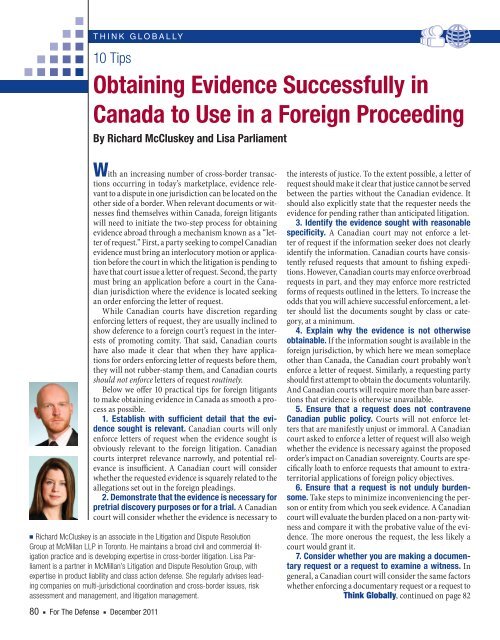For The Defense, December 2011 - DRI Today
For The Defense, December 2011 - DRI Today
For The Defense, December 2011 - DRI Today
You also want an ePaper? Increase the reach of your titles
YUMPU automatically turns print PDFs into web optimized ePapers that Google loves.
ThInk gLObaLLy<br />
10 Tips<br />
Obtaining Evidence Successfully in<br />
Canada to Use in a <strong>For</strong>eign Proceeding<br />
By Richard McCluskey and Lisa Parliament<br />
With an increasing number of cross- border transac- the interests of justice. To the extent possible, a letter of<br />
tions occurring in today’s marketplace, evidence rele- request should make it clear that justice cannot be served<br />
vant to a dispute in one jurisdiction can be located on the between the parties without the Canadian evidence. It<br />
other side of a border. When relevant documents or wit- should also explicitly state that the requester needs the<br />
nesses find themselves within Canada, foreign litigants evidence for pending rather than anticipated litigation.<br />
will need to initiate the two-step process for obtaining 3. Identify the evidence sought with reasonable<br />
evidence abroad through a mechanism known as a “let- specificity. A Canadian court may not enforce a letter<br />
of request.” First, a party seeking to compel Canadian ter of request if the information seeker does not clearly<br />
evidence must bring an interlocutory motion or applica- identify the information. Canadian courts have consistion<br />
before the court in which the litigation is pending to tently refused requests that amount to fishing expedi-<br />
have that court issue a letter of request. Second, the party tions. However, Canadian courts may enforce overbroad<br />
must bring an application before a court in the Cana- requests in part, and they may enforce more restricted<br />
dian jurisdiction where the evidence is located seeking forms of requests outlined in the letters. To increase the<br />
an order enforcing the letter of request.<br />
odds that you will achieve successful enforcement, a let-<br />
While Canadian courts have discretion regarding ter should list the documents sought by class or cate-<br />
enforcing letters of request, they are usually inclined to gory, at a minimum.<br />
show deference to a foreign court’s request in the inter- 4. Explain why the evidence is not otherwise<br />
ests of promoting comity. That said, Canadian courts obtainable. If the information sought is available in the<br />
have also made it clear that when they have applica- foreign jurisdiction, by which here we mean someplace<br />
tions for orders enforcing letter of requests before them, other than Canada, the Canadian court probably won’t<br />
they will not rubber- stamp them, and Canadian courts enforce a letter of request. Similarly, a requesting party<br />
should not enforce letters of request routinely.<br />
should first attempt to obtain the documents voluntarily.<br />
Below we offer 10 practical tips for foreign litigants And Canadian courts will require more than bare asser-<br />
to make obtaining evidence in Canada as smooth a protions that evidence is otherwise unavailable.<br />
cess as possible.<br />
5. Ensure that a request does not contravene<br />
1. Establish with sufficient detail that the evi- Canadian public policy. Courts will not enforce letdence<br />
sought is relevant. Canadian courts will only ters that are manifestly unjust or immoral. A Canadian<br />
enforce letters of request when the evidence sought is court asked to enforce a letter of request will also weigh<br />
obviously relevant to the foreign litigation. Canadian whether the evidence is necessary against the proposed<br />
courts interpret relevance narrowly, and potential rel- order’s impact on Canadian sovereignty. Courts are speevance<br />
is insufficient. A Canadian court will consider cifically loath to enforce requests that amount to extra-<br />
whether the requested evidence is squarely related to the territorial applications of foreign policy objectives.<br />
allegations set out in the foreign pleadings.<br />
6. Ensure that a request is not unduly burden-<br />
2. Demonstrate that the evidence is necessary for some. Take steps to minimize inconveniencing the per-<br />
pretrial discovery purposes or for a trial. A Canadian son or entity from which you seek evidence. A Canadian<br />
court will consider whether the evidence is necessary to court will evaluate the burden placed on a non-party witness<br />
and compare it with the probative value of the evi-<br />
■ Richard McCluskey is an associate in the Litigation and Dispute Resolution dence. <strong>The</strong> more onerous the request, the less likely a<br />
Group at McMillan LLP in Toronto. He maintains a broad civil and commercial lit- court would grant it.<br />
igation practice and is developing expertise in cross- border litigation. Lisa Par- 7. Consider whether you are making a documenliament<br />
is a partner in McMillan’s Litigation and Dispute Resolution Group, with tary request or a request to examine a witness. In<br />
expertise in product liability and class action defense. She regularly advises lead- general, a Canadian court will consider the same factors<br />
ing companies on multi- jurisdictional coordination and cross- border issues, risk whether enforcing a documentary request or a request to<br />
assessment and management, and litigation management. Think Globally

















